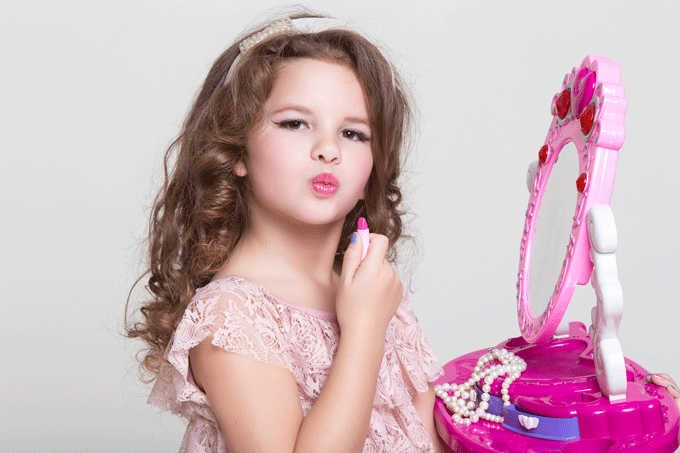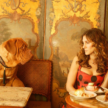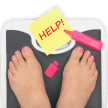I know exactly the angle that my face looks best in photos. Or at least I thought I did. My chin is tilted slightly down and to the right. I smile, but not too big because my natural smile shows too-big teeth and a lot of gum. I used to believe that this pose concealed, or at least mitigated, some of my flaws: the small bump on my nose, my crooked right tooth, a narrow jaw. I feel badly that I know this. I wish I didn’t care. Funny enough, people often tell me I’m photogenic, which I take to mean prettier in photographs than I am in real life.
After the birth of my daughters I became concerned about how my history of self-consciousness might affect them. I considered how much time and energy I’d wasted over the years worrying about the way I look, wishing this or that thing were different. I wanted it to be better for my girls. I want my girls to be soccer players, not beauty queens. If they must date, I hope they date boys or girls who love them for their minds and strongly held opinions. I hope they have friends with tangled hair, dirty jeans and make-up free faces. I hope they discover beauty and fashion late enough that it amuses them, but doesn’t painfully impact their sense of self. In short, I want them to be nothing like my teenage self.
As a teen, I cared inordinately about the way I looked. I know that’s typical for an adolescent girl, but I was worse than average. My Halloween costumes reflected my obsession with ultra-feminine ideals: a cheerleader (MSU), a Miss America contestant (Texas), a Southern belle (seriously, I wore an old hoop skirt from my mother’s prom dress), and many early years as a fairy princess. True, the pageant contestant was done with a hint of irony. I played it for laughs. But I secretly longed to be one of those impossibly shiny and immaculate girls.
I was a ballerina from second grade to my junior year in high school, and there are many pictures of me in overdone makeup and tutus that I find painful to look at. The graceful lines of my body masked my internal awkwardness, the physical control a veil over the unseen struggle of plummeting self-worth. There isn’t anyone to blame for this. My mother, a professor, feminist and civil rights activist (among other things), wears almost no makeup and questions the morality of pedicures. My best friend growing up was an extremely bright and levelheaded girl who was not particularly preoccupied with boys or appearance. Actually, in hindsight I’m not sure how or why she put up with my fixation on appearance. I’m not sure why I did either.
Growing up, I was pretty enough to have dates to all the dances. Pretty enough to attract sufficient male attention and the occasional jealous look from other girls. However, I knew I wasn’t one of those heartbreakingly exquisite waifs on the covers of magazines. I had plenty of other things going for me—I was smart, a good dancer, funny and friendly—but it worried me, it niggled at me, this lack of perfection.
Why did I want so badly to be beautiful? Why was pretty enough not good enough? I still don’t really know, but when I’ve tried to look at it honestly, what I come up with is power. To simply walk into a room and be special before doing or saying anything seemed incredibly potent to me. This is, I’m sure, partly the gift of a culture that values women more for what they look like than what they have to offer, a culture in which, on television and in the movies, even neuroscientists and paleontologists are spectacularly gorgeous.
As an adult, I traveled some distance from the ferocious longings of my adolescence. I learned to value myself for my accomplishments and abilities. I learned to love my body for what it could do, rather than merely what it looked like. But, in weak moments, I still felt a lack, a little hole where my beauty should be.
When my daughters were about 7 months old, my friend Mia took a photo of Rose and me. Rose’s face is leaned against mine and I am holding her close, smiling wide at the camera. We are sitting on our sunny front porch, beaming. In this photo I’ve forgotten everything I thought I knew about how I look best and, actually, I look fantastic. I mean, I look exhausted. My crooked nose and tooth are clearly on display. But I look happy. And this picture does what, it finally occurs to me, pictures are supposed to do. It records a moment in time so I can have access to it forever. Now I have this photo of my flawed and glowing face reminding me of what I’ve always known: beauty is not perfection.
Right now, in my life as a stay-at-home mom, I often look bedraggled and haggard. Sometimes I look in the mirror and wish I had my old problems. But here’s the thing, for a very long time my imperfect face was the only one my daughter, Eva, wanted to see. Every other face made her howl at the moon. My lullabies were the ones my daughters wanted to send them to sleep. I really don’t have a voice, and that’s putting it kindly. But babies don’t care. They’re soothed just as well by the hoarse and the tuneless, especially when the imperfect voice belongs to their mother.
One of the many satisfactions of motherhood is that you find new uses for yourself. You are food and essential comfort, guide and translator. You keep opening up doors in yourself to see what you can offer this extraordinary guest. Somehow, in this exhausting, exhilarating exercise, I discovered there was much more to me than I’d known, and lots of it was better than I’d imagined. More old insecurities fell away. Having finally found deeper purposes for myself, I hope I’ll be better able to help my daughters dodge the many pitfalls that lay in wait for girls in our culture: the skinny models in magazines, the scantily clad, pouting pop singers, and the photoshopped, plastic-surgery-altered celebrities. No one on this earth can protect teenage girls from fussing with their hair for an inordinate amount of time. But I sure hope I can protect them from the darker struggles like eating disorders, and the sinking self-respect so many young women experience at the onset of adolescence.
For months I sang my daughters the same tune. It was a melody I couldn’t place, though it sounded familiar. I was humming it to people, asking them if they recognized it, but no one could name it. Then one day, playing a classical music CD in the car for my girls, I heard it. When I discovered the title later, I was struck by how well it named the enormity of my good fortune.And, in that moment, I experienced a wave of amazement at how, in spite of all the years of haplessness and superficiality, I have stumbled on so much grace. It turns out that this song I have been whispering in my babies’ ears all this time is Ode to Joy.















2014/05/27 at 9:25 pm
So well written, Emily. It’s as if you were reading my thoughts about myself at a younger age and what I hope for my two young girls as they grow up. I am sure many more women out there can relate too. Bravo!